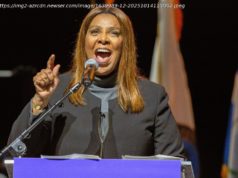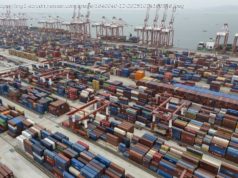Key issues on the line this Election Day include taxes, health care costs and the nation's ballooning federal deficit
A divided American electorate, already shattering voting records for midterm elections, will decide control of the U. S. House of Representatives and the Senate on Tuesday. That’s making investors more jittery than usual ahead of the final vote counts.
A renegotiated and renamed North American Free Trade Agreement will need Congressional approval. Also potentially on the legislative agenda are enormous economic issues like another income tax cut, rising drug prices, a substitute for Obamacare, federal spending increases (or cuts) and a ballooning public deficit fueled by the last GOP income tax cut.
“Most of my days are spent talking to clients about what are the polls showing, which way are the winds blowing, what could the implications be. This, of course, touches on everything: trade policy, infrastructure, the Fed raising interest rates,” Torsten Slok, chief international economist at Deutsche Bank, told CBS MoneyWatch.
Betting markets, as well as polls from CBS News and other outlets, indicate the House of Representatives is likely to swing to a Democratic majority, with the GOP keeping a slim margin in the Senate.
Whatever happens on Tuesday, here is how the results are likely to play out in major areas of the economy.
A dismal October wiped out most of the market’s gains this year, while an elevated VIX, an index that measures market volatility, suggests more day-to-day mayhem is possible. The good news is that the stock market jitters will likely end as soon as the midterms do—regardless of who the winners are. Research shows that historically, nearly every U. S. election since the World War II has been followed by a so-called relief rally, where stocks rise at least modestly.
“Historically, stock market volatility increased ahead of the elections due to policy uncertainty. However, stocks also tended to rebound strongly coming out of midterm election-year lows,” LPL Financial wrote in a research note last month. “We are now entering the most favorable part of the four-year presidential cycle.”
Tariffs and trade are finding their way into the elections, too. Though the White House renegotiated a trade agreement to replace the North American Free Trade Agreement, or NAFTA, Congress must approve it — something that becomes less certain with a Democratic-controlled House in January. And the effects of Mr. Trump’s already imposed and threatened tariffs on steel and aluminum, cars and trucks, and goods from China are seeping into corporate finances large and small. Millions of jobs are at stake, and prices are rising for consumer goods from autos to food to televisions.
“It comes down to what can be done with executive orders and what has to go through Congress,” Deutsche Bank’s Slok said. “Congress will probably play a bigger role in trade policy. The majority in the House will probably start showing more interest in trade policy.”
Congress controls the nation’s purse strings. That, Slok notes, could produce “quite a changed landscape in what’s possible with Congress.”
If Democrats gain control of the House, or even the Senate, gridlock will almost certainly ensue. That threatens President Donald Trump’s deregulatory agenda, a proposed second round of tax cuts, infrastructure spending, or potential cuts to Social Security and Medicare entitlements.
Still, a Democratic Congress would be hard-pressed to “undo the major market-impactful legislation that has already been passed,” UBS analysts note in a recent report. Many key regulations have been undone, and Mr. Trump retains the power to veto any Congressional legislation.
“With the economy already operating close to its full potential, and concerns mounting over further pro-cyclical fiscal measures, it’s less important for Congress to be able to easily pass major legislation, including additional tax cuts that could further widen the deficit,” UBS wrote. In that scenario, split-party control could be good for the markets, since it reduces the chance of any major legislation becoming law and unintentionally harming the economy.
But if gridlock reaches the levels it did in 2011, causing government shutdowns or another crisis over the debt ceiling, the opposite would likely happen. During the 2011 episode, when the U. S. Treasury came close to a technical default on its debt, the S&P 500 dropped by nearly 20 percent. A repeat of this scenario “is not only possible but could actually become likely in an extreme gridlock environment,” according to UBS.
Infrastructure — the catch-all phrase for big construction projects from highways and subways to water systems to the electric grid — may get a boost no matter what the election’s outcome, according to UBS. That could come in the form of a $1 trillion infrastructure bill discussed by both sides in the 2016 Presidential contest, even as the deficit balloons over the next few years pay for the Republican-led tax cuts of 2017.
Both sides regularly say they want infrastructure progress. Vice President Mike Pence told The Hill this week the administration wants to push ahead with infrastructure during the lame-duck session following the election. While Mr. Trump’s approach may be different from House Democrats’ vision, the shared goal may leave room for a joint effort, Rep. Steny Hoyer, a Maryland Democrat, told the New York Times.
House minority leader Nancy Pelosi, in an interview last month with CNN and in a tweet, emphasized infrastructure as a priority for the Democrats. “By and large, infrastructure has always been a bipartisan issue. We can create jobs by investing in new infrastructure projects like our water systems & broadband internet,” she said in the tweet.
Any form of outsized federal spending would likely juice the economy even more by spurring investment and hiring. But it will have a downside: rising interest rates. Unless the Democrats can wrangle a partial repeal of last year’s tax cuts or institute a new tax on wealthier Americans — possibilities Wall Street views as unlikely — further spending will have to be deficit-financed. Meanwhile, the deficit has tripled since 2007, and Treasury Secretary Steve Mnuchin recently surpassed his predecessor’s record for the amount of notes and bonds the government issues to fund its debt.






